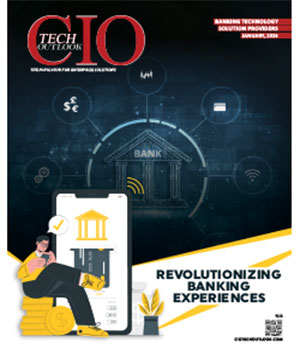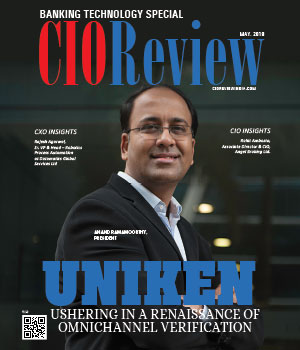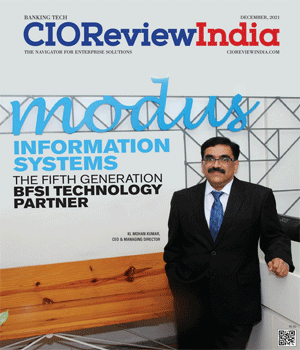
Three Key Benefits of Adopting Composable Banking for Financial Institutions
Darshan.K, Correspondent, CIOTech Outlook Team | Sunday, 17 December 2023, 18:28 IST
 McKinsey's research shows that revenues in the fintech industry are expected to grow almost three times faster than those of traditional banking sectors between 2023 and 2028. These trends are also coinciding with—and in many ways catalyzing—the maturation of the fintech industry.The previous decade has witnessed a monumental surge in Fintech. This phenomenon has given room to composable banking. This demand to keep pace has made banks reconsider how they design customer services.
McKinsey's research shows that revenues in the fintech industry are expected to grow almost three times faster than those of traditional banking sectors between 2023 and 2028. These trends are also coinciding with—and in many ways catalyzing—the maturation of the fintech industry.The previous decade has witnessed a monumental surge in Fintech. This phenomenon has given room to composable banking. This demand to keep pace has made banks reconsider how they design customer services.
Composable banking allows the banks to be more flexible and has proven advantageous compared to being a monolith. Here are three significant benefits banks are witnessing from adopting this architecture in their systems.
Agility in Adaptation
The pace at which technological changes occur demands that financial institutions remain agile to cater to the rising customer needs and industry trends. Composable banking provides the framework that permits institutions to promptly respond to fluctuating market dynamics, regulatory changes and upcoming technologies.
The flexibility that composable banking enables banks to break down their monolithic infrastructure into modular components paves the way to provide tailored solutions by combining and repurposing various parts. Institutions using composable banking can seamlessly integrate necessary components without compromising the entire system.
"Using data analytics is a must of risk management. We need to predict which steps of ours, other departments or even external parties will have risk impact and adjust for it timely so we stay within our share-holders risk appetite,"Kirill Odintsov, Head, Home Credit Indonesia.
Revolut, a fintech disruptor, exemplifies the agility afforded by composable banking. Revolut swiftly integrated a crypto module into its platform when it identified the growing demand for cryptocurrency services. This adaptability met customer expectations and positioned Revolut as an innovative player in the market.
Enhanced Customer Experience
It is a proven fact that customer service is what makes or breaks any service-based business. Financial institutions must leverage technology to provide seamless and personalized services. Composable banking facilitates an avenue for customer-centric solutions that significantly enhance user experience across various parameters.
Composable banking permits financial institutions to offer personalized services by assembling and modifying modular components. For example, a bank can easily integrate a third-party personal finance management module to give customers real-time budgeting insights. This modular approach ensures that customers receive tailored services that align with their unique financial needs and preferences.
"Enterprise architects must integrate real-time data solutions with existing systems and data sources to provide a complete picture," Niraj Naidu, APJ Head of Field Engineering, Datastax.
Monzo, a digital bank, embraces composable banking to deliver a modular banking experience. Through a marketplace of integrated apps and services, Monzo users can personalize their banking journey. Whether adding travel insurance or connecting to investment platforms, Monzo's composable approach enhances the overall customer experience by offering diverse services within a single platform.
Cost-Efficiency and Innovation
Traditional banking systems often face challenges regarding high maintenance costs and the slow pace of innovation. Composable banking addresses these issues by fostering cost-efficiency through modular architecture and providing a foundation for continuous innovation.
The modular nature of composable banking allows financial institutions to update or replace individual components without disrupting the entire system. This modularity significantly reduces the complexity and cost of maintaining and updating legacy systems. As a result, financial institutions can allocate resources more efficiently, focusing on strategic initiatives rather than managing cumbersome, interconnected systems.
BBVA, a global financial institution, has embraced composable banking to drive innovation and cost-efficiency. BBVA can swiftly integrate new technologies and services by adopting a modular architecture, such as open banking APIs and digital onboarding processes. This flexibility reduces operational costs and positions BBVA as an agile player in the competitive financial landscape.
"Product validation is the biggest roadblock as the process absorbs most of the time in the entire product management cycle. This can mainly be attributed to non-standardized data testing processes and the time required in bringing real data into simulation," Puran Parekh, CEO & MD, iASYS
Composable banking represents a paradigm shift for financial institutions, offering agility, enhanced customer experiences, and cost-efficiency. As the financial services industry continues to navigate a landscape marked by technological disruption, those institutions that embrace composable banking are better positioned to thrive in the digital era. The real-life examples of Revolut, Monzo, and BBVA illustrate the tangible benefits of adopting a composable approach, showcasing how this transformative technology is reshaping the future of banking. In this era of rapid change, composable banking is a strategic enabler, empowering financial institutions to innovate, adapt, and deliver value in an ever-evolving market.
CIO Viewpoint
Machine Learning In Cybersecurity: The Risks &...
By Neelesh Kripalani, Chief Technology Officer, Clover Infotech
5 Major Saas Trends To Check-Out In 2021
By Vikas Bhonsle, CEO, Crayon Software Experts India
Artificial Intelligence & The Disruptive Chatbot
By Vishal Sinha, President & CIO, Tranzlease Holdings
CXO Insights
Crafting the Digital Journey in Banking
By Janifha Evangeline
Incorporating Blockchain Capabilities into...




.jpg)
.jpg)





